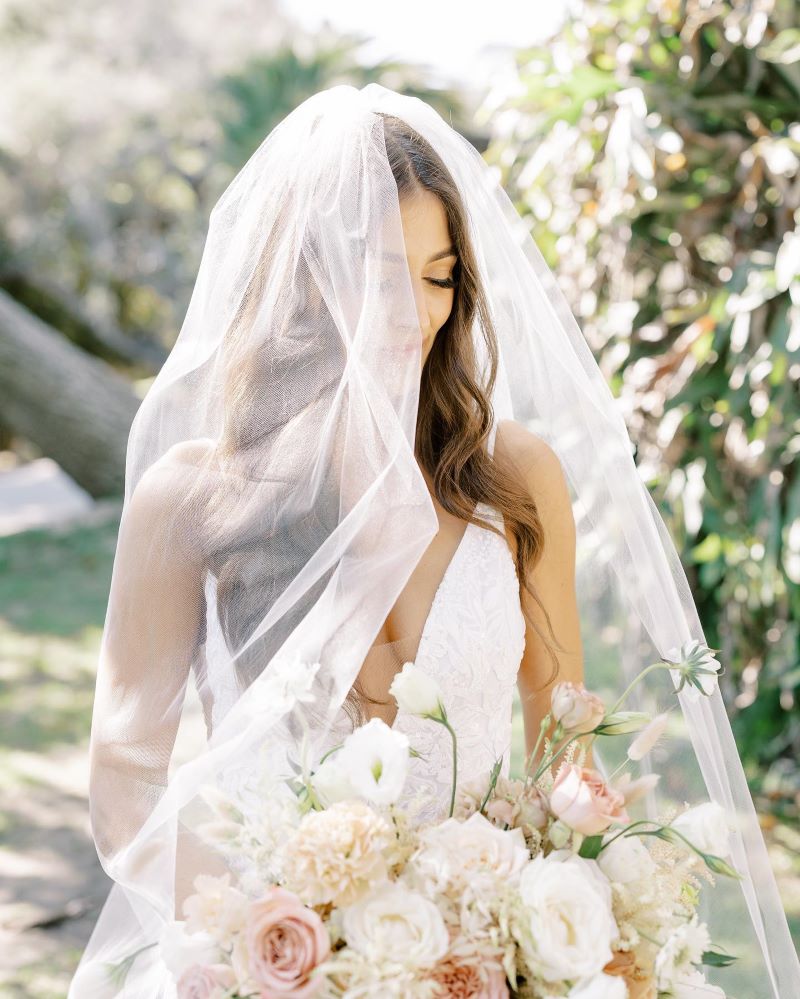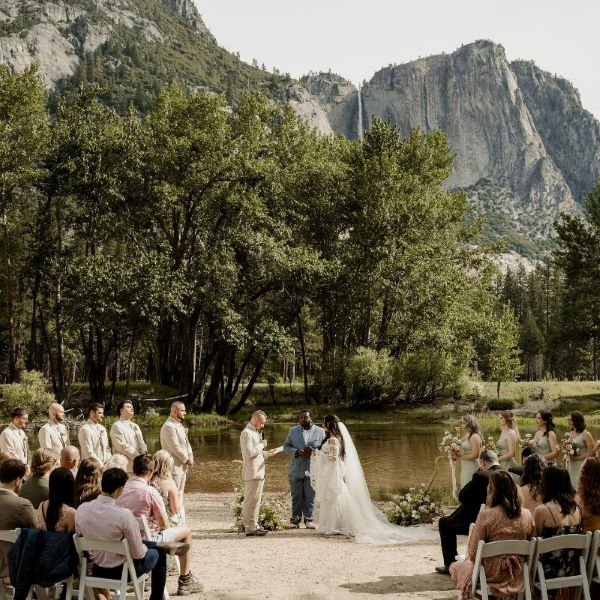Few individual moments embody the spirit of your wedding and who you are as a couple like your wedding vows do. As a pivotal moment in your wedding ceremony, this emotional exchange sets the tone for your entire celebration. Whether you write the vows yourself or borrow from tried-and-true traditional marriage vows, it's important to take time with these promises that will define your special day.
Need some help finding the perfect words? That’s where this guide comes in handy. Here, the wedding experts at Minted have put together everything you need to know to make sure your vows are meaningful, magical, and a moment you’ll never forget.
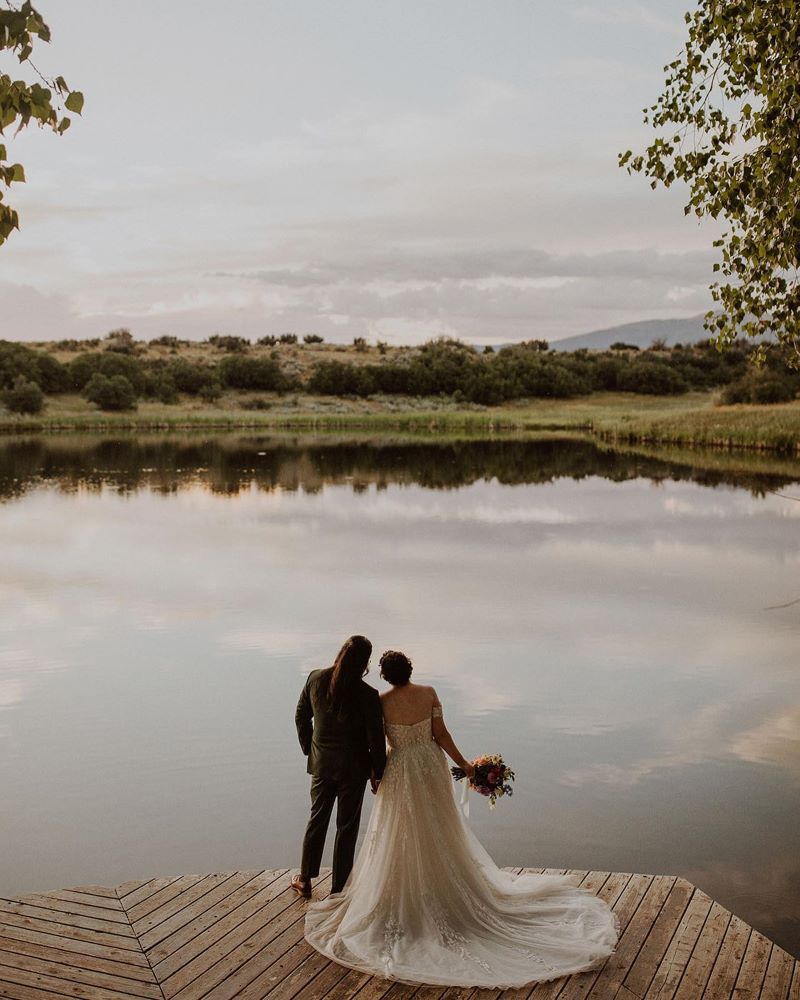
Photo by Carissa Marie Photography
Types of Wedding Vows
The first step in perfecting your wedding vows? Decide whether or not you want to recite vows first spoken by your officiant, or write your own. The former tends to be more ceremonial and traditional, while the latter is more personal and modern.
Neither option is better than the other—it’s all about what suits your style as a couple.
Traditional Wedding Vows
You’ve decided to stick to the script! Still, there are some decisions to be made as to which wedding vows you choose to recite, whether you’re selecting from traditional religious vows or your standard, secular “I do” vows.
Read more about traditional wedding vows.
Religious Vows
Many couples find beauty in following time-honored traditions passed down through generations. Going with classic religious vows is the perfect way to ensure your ceremony honors your faith.
Secular Vows
The secular “I do” vows may be simple, but they’re no less serious than any other style of wedding vows.
Read more about secular wedding vows.
Romantic Wedding Vows
It doesn’t get any more romantic than a wedding, so it’s no surprise that many couples want to bring that romance to their wedding vows. How can you express the depths of your affection for your future spouse without being corny or cliché? Check out this article for tons of great examples. (Hint: get specific.)
Short and Sweet Wedding Vows
Short, meaningful promises work especially well for outdoor ceremonies, emotional speakers, or couples who prefer simplicity. The key is focusing on quality over quantity – choose words that capture the essence of your commitment in just 60 seconds or less.
For maximum impact in minimal time, focus on three elements: a heartfelt opening, one core promise, and a forward-looking statement. For example: "[Name], you make every day better. I promise to choose and cherish you through all of life's adventures. My love for you will only grow stronger with each passing year."
Long-Term Couple Vows
When you've already built a life together, wedding vows take on a different meaning. Instead of making brand new promises, you're celebrating a proven love story and consciously choosing to deepen your commitment.
Consider highlighting specific moments that have strengthened your bond, challenges you've overcome as a team, and why you're choosing marriage now. For example: "After twelve wonderful years together, I know exactly who and what I'm choosing. You've been my partner through [specific moments], and today, I'm proudly promising forever to the person who already holds my heart."
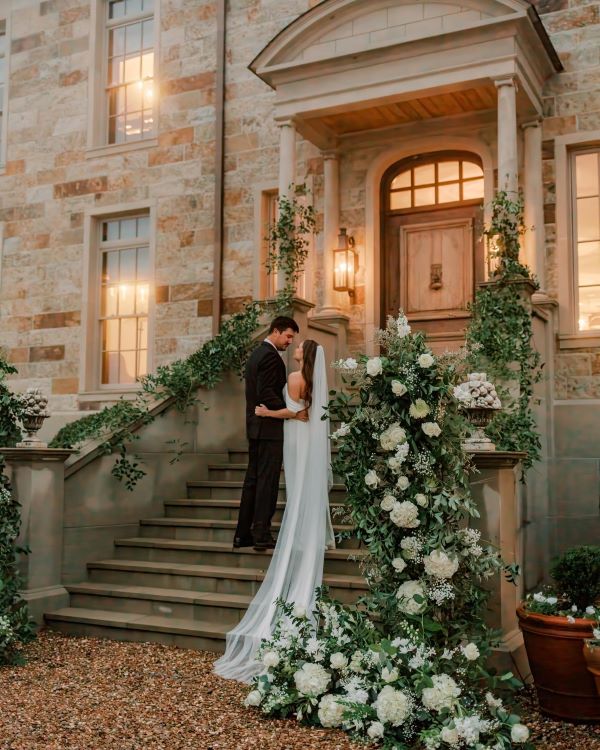
Photo by Emily Quigley
Funny Wedding Vows
Incorporating humor into your vows is a perfect way to show off your personality as a couple. The trick is finding the balance between silly, sassy, and sweet, so you can make all your loved ones laugh—without turning the ceremony into a joke.
Read more about funny wedding vows.
Musical Vows
For couples who share a deep connection to music, incorporating melody and lyrics into your vows can create an unforgettable ceremony moment. Whether you're weaving in meaningful song lyrics or setting your promises to music, the key is ensuring the musical elements enhance rather than overshadow your genuine promises.
Keep the focus on your commitment while letting music add depth to your words. Consider working with your musicians to create the perfect backdrop, and always have a non-musical backup plan ready. Looking for the perfect melody? Browse our wedding song selection for inspiration or background music during your vow exchange.
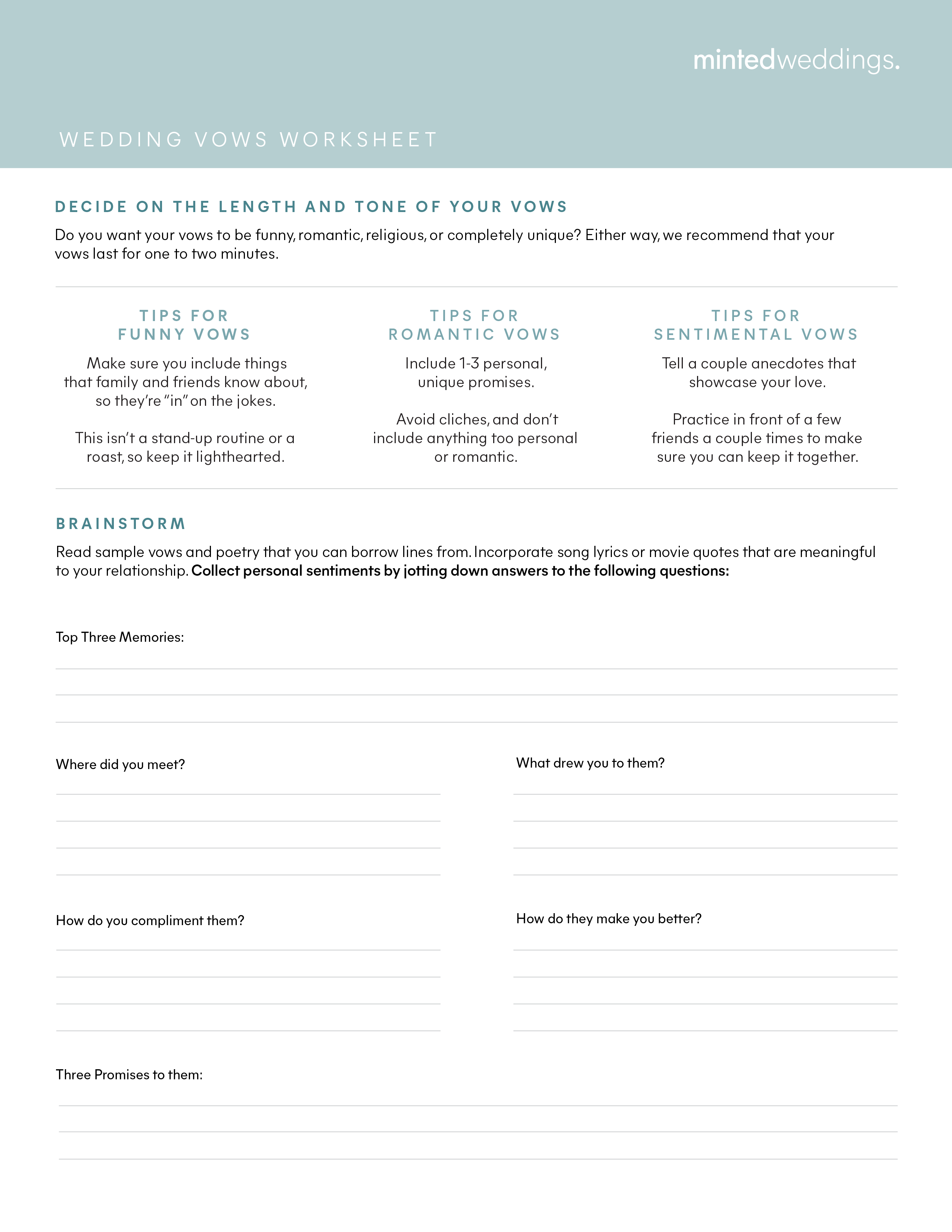
Wedding Vow Writing: From First Draft To “I Do”
Yes, writing your own vows can feel daunting. Yes, it’s normal to experience a bit of writer’s block. And yes, there are plenty of tips and tricks to writing the perfect wedding vows for your big day.
Our top 10 tips when writing your own wedding vows:
1. Decide on tone and length
You want your vows to reflect your unique personality; after all, that’s why you’re writing them yourself. But this is ultimately a celebration of who you are as a couple, so you’ll want to make sure you approach your vows from a similar mindset. You can go humorous, serious, romantic, religious—whatever feels right to you both. You should also agree on a general length (we recommend one to two minutes each), so your vows feel even to your guests.
2. Get inspired
The best way to kickstart your vow writing? Look to other vows you love for guidance and inspiration. Don’t be afraid to lift lines from your favorite poems, quotes, religious texts, or other vows you’ve read or heard that resonate (we don’t recommend a full copy-and-paste job, but borrowing a line or two is totally appropriate). You’ll start to identify commonalities in the expressions you’re drawn to, and that will help shape your own vows. To help get you started, check out some of our favorite wedding vow samples.
3. Start with some notes
Before putting pen to paper, take a moment to think about your relationship—favorite memories, moments, and milestones. Think back to when you first met your future spouse, or how you felt after your first date. Think about trips you’ve taken together, times when you took special care of each other, any challenges you’ve overcome, what makes you both laugh, times you've been particularly happy, what you admire about your fiancé, and what your hopes for the future are. These notes will give you those all-important details to pull from when you’re ready to draft your vows.
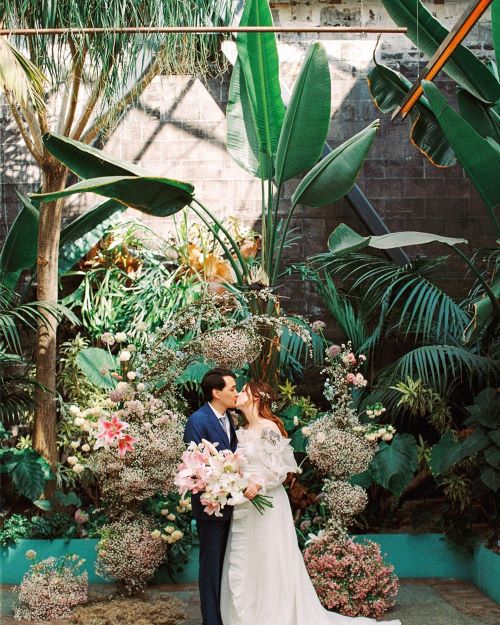
Photo by Mary Costa Photography
4. Make some promises
The promises you’re making to one another—the “to have and to hold” part—are the crux of wedding vows. You can pull directly from those traditional “I do” recitations, include them after you’ve delivered your own vows, or put your own spin on these promises entirely. But these promises are what cement your commitment to one another, so pick one, two, or several to deliver and commit to. These can be broad (“I promise to love you every day of our lives together.”) or specific to your unique relationship (“I vow to always let you have the last blueberry pancake.”).
5. Write your first draft with time to spare
You have your notes, you have your promises—you’re ready to start putting them all together. You can find some wedding vow worksheets online to help give your ideas shape, but generally, you’ll want to include—what has brought you together, what you love about your partner, your promises, and a look to the future. And get to writing this draft early—you don’t want the added stress of last-minute vow writing. Aim to have your vows written at least three weeks before your wedding to give yourself ample time to practice (see Tip #8 below).
6. Remove inside jokes and embarrassing anecdotes
You want to be funny? Great. Loving? Of course. Silly? Why not! But while you’re first and foremost reading your vows to your soon-to-be spouse, you’re also reading them in front of your family and friends. You want them to enjoy this moment, too, so filling your speech with references only your fiancé will understand isn’t the best way to go. Even worse is embarrassing them in front of your guests (no references to exes or messy college days, please).
7. Watch out for those clichés
Clichés are a bit trickier to detect (and remove). After all, they’re clichés for a reason—they’re great, but overused expressions. If you see a number of these in your draft, try writing the same sentiment, but in a way that brings in specifics of your relationship (e.g., “It was love at first sight” could become, “I’ll never forget the feeling I had when I first saw you walk into that restaurant in downtown San Francisco…”). Can’t think of the perfect replacement? No worries—one cliché won’t make your vows any less meaningful.
8. Practice reading them out loud
This. Is. Crucial! Reading your vows out loud is not only important for perfecting your delivery and boosting your confidence, it’s also a great editing tool. What reads well in your head may sound a bit clunky out loud, and you’ll be able to more easily find places to edit and adjust. Bonus points: record yourself reading them. We know, we know, but being able to hear your own vows—and see yourself reading them—is a great tool for fine-tuning your delivery.
9. Choose your vow presentation
Your vows deserve a special home for both the ceremony and beyond. While reading from your phone isn't recommended, you have several elegant options:
- A keepsake vow book that becomes a cherished memento
- A handwritten note on premium wedding stationery
- Beautifully printed cards matching your wedding colors
- Classic linen cardstock
Whatever format you choose, ensure it feels special and coordinates with your partner's presentation. Consider how it will look in photos and feel in your hands during the ceremony. Remember to make backup copies and share them with your wedding party, just in case.
Pro Tip: After the wedding, preserve your vows in a vow book alongside photos and mementos from your special day. Alternatively, you can turn your vows into an art print to hang in your home.
10. Give yourself time when it’s time
The moment has arrived! When it’s your turn to speak, give yourself a moment to compose yourself: take a deep breath, make sure you’re standing comfortably (no locked knees!), and look your partner in the eyes—they’re your person, and their supportive look will provide you with comfort. If there’s a microphone, make sure it’s close to your mouth, and go! The first few words will be the hardest, and don’t worry if you trip up a bit. No one will remember that—not even your beloved.
Wedding Vow Preparation Checklist
Your wedding vows will be one of the most meaningful moments of your ceremony. This timeline helps ensure you're fully prepared to share your promises confidently and beautifully.
3 Months Before
- Have an open discussion with your partner about vow style and format.
- Decide on approximate length (1-2 minutes recommended).
- Agree on overall tone (romantic, humorous, traditional).
- Begin collecting memories and inspiration.
2 Months Before
- Write your first draft.
- Share with a trusted friend for feedback.
- Begin light practice sessions.
- Consider any cultural or religious elements to include.
- Review the wedding rehearsal guide to understand the ceremony flow.
1 Month Before
- Finalize your vows.
- Create a clean, final version in your vow book.
- Make backup copies:
- Digital version
- Print copy for wedding party
- Email to yourself.
- Start practicing delivery with timing.
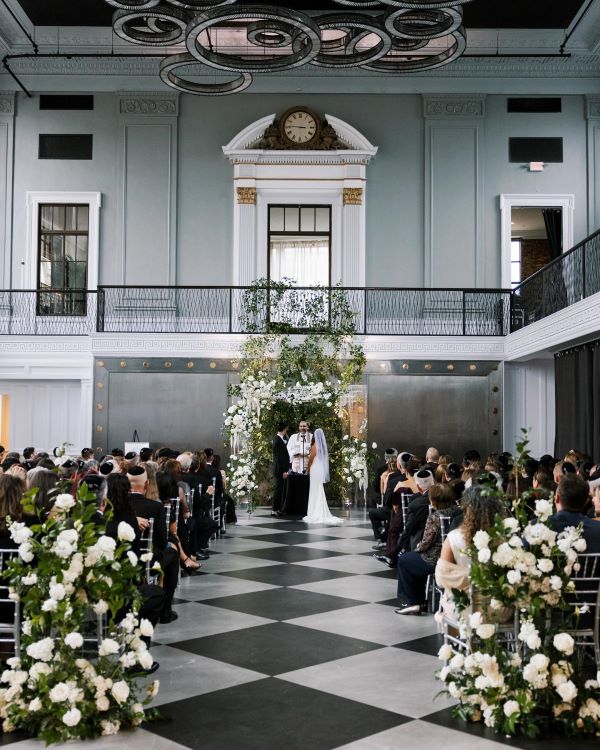
Photo by Afrik Armando
Week of Wedding
- Complete final practice runs.
- Share copies with your officiant, best man/maid of honor, and wedding planner.
- Pack vows in a wedding essentials bag.
Day Before
- Practice your vows at the wedding rehearsal to feel more confident with timing and delivery.
- Practice calming techniques.
- Ensure vows are safely stored.
- Confirm backup copies are ready.
Wedding Day
- Keep vows in a secure, accessible spot.
- Take a moment to center yourself.
- Hold vows at chest height.
- Make eye contact with your partner.
- Speak slowly and clearly.
After The Ceremony
- Save your vow book in a special place.
- Consider displaying your vows at home.
- Add to your wedding memory box.
- Start your marriage time capsule.
Preparation Tools You'll Need
- Backup notecards
- Recording device for practice
- Timer
- Emergency vow kit (copy of vows, tissues, water)
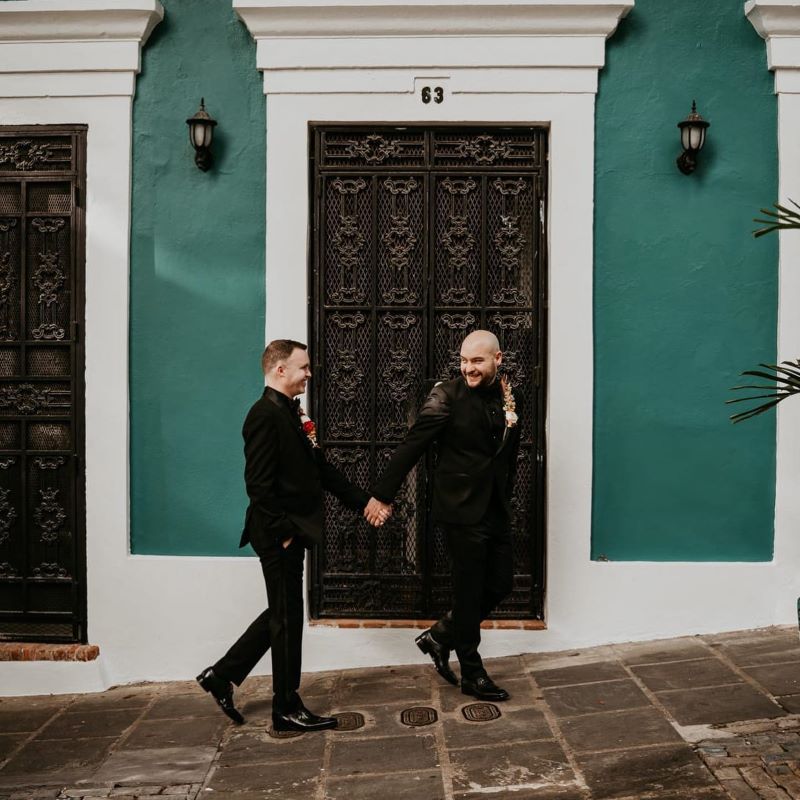
Photo by Nilka Gissell Photography
FREQUENTLY ASKED QUESTIONS ABOUT WEDDING VOWS
Writing and delivering wedding vows can bring up many questions, from timing and tone to coordination with your partner. Here are answers to some of the most common questions couples ask as they prepare their wedding vows.
How long should wedding vows be?
Aim for vows that take 1-2 minutes to deliver (about 150-250 words). This gives you enough time to express meaningful promises while keeping guests engaged. Remember, a beautiful sentiment doesn't need to be lengthy.
Should we memorize our vows?
While memorizing can create a more intimate moment, it's not necessary. The most important thing is delivering your promises with sincerity. Many couples choose to read their vows, which can help calm nerves and ensure you don't forget important points.
Can we write different lengths of vows?
While your vows don't need to be identical in length, they should be relatively balanced. Try to keep them within 30 seconds of each other to maintain the ceremony flow.
What if I cry during my vows?
Getting emotional is completely natural and often makes the moment more authentic. Take deep breaths, pause when needed, and keep a handkerchief nearby. Your officiant can hold your vows if you need a moment to compose yourself.
Do we have to share our vows with each other beforehand?
This is entirely your choice. Some couples prefer the surprise, while others coordinate to ensure similar tones and lengths. Discuss this with your partner early in the planning process.
Can we include inside jokes?
While personal touches make vows special, keep inside jokes minimal. Your guests should be able to follow and appreciate the sentiment of your vows.
What if our families have different religious traditions?
You can blend traditional religious vows with personal promises or create a ceremony that honors both backgrounds. Consider consulting with religious leaders and family members to find a respectful balance.
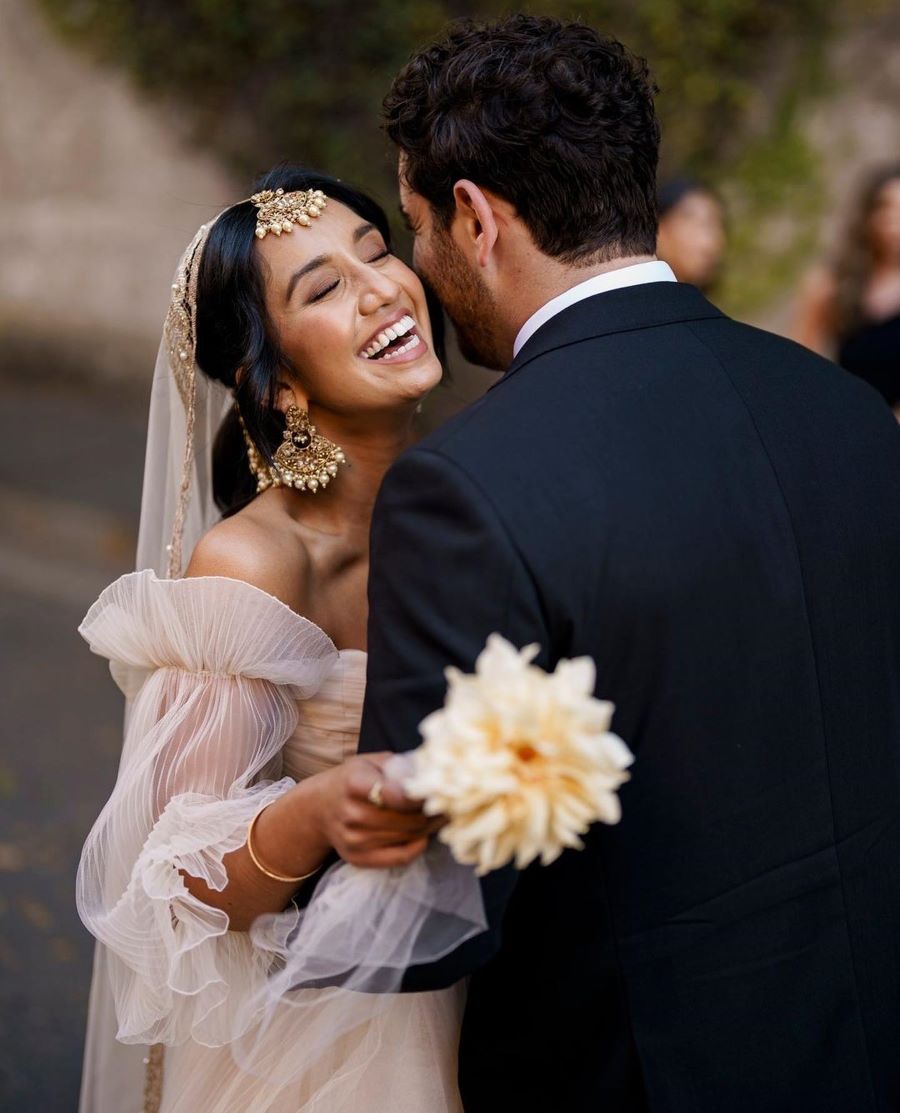
Photo by Mark Jay Photography
Is it okay to use quotes or song lyrics?
Yes! Just keep them brief and meaningful to your relationship. Make sure to weave them naturally into your own words rather than relying too heavily on others' expressions.
What if we're having a bilingual ceremony?
You can deliver vows in multiple languages, use translations, or have an interpreter. Just remember to account for translation time in your ceremony timeline.
Can we change traditional vows?
Most officiants and religious institutions allow some modification of traditional vows. Discuss your desired changes early to ensure they align with any religious or legal requirements.
Create Your Perfect Wedding Vows
Your wedding vows are more than just words – they're the heart of your ceremony and the foundation of your marriage. Whether you choose traditional promises, write your own, or find a beautiful balance between the two, the most meaningful vows are those that feel authentic to your relationship. Take time to prepare, practice with purpose, and most importantly, speak from your heart.



